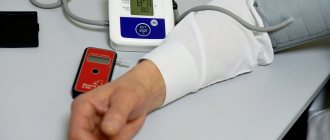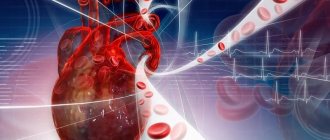To the question “How does alcohol affect blood pressure?” there are two answers:
- if used rarely in safe dosages - no way;
- Frequent consumption of alcohol always increases blood pressure.
The effect of alcohol on blood pressure is realized through several biochemical mechanisms:
— ethyl alcohol dilutes cell membranes and causes their fluidity. If a person begins to abuse alcohol, the body turns on an adaptation mechanism to protect cell membranes from rapid damage. This is done by increasing the cholesterol content in the membrane, due to which the membranes of the blood vessels become inelastic, and the level of blood pressure increases.
— Excessive alcohol consumption leads to water-electrolyte imbalance and dehydration of the body during intoxication. With frequent drinking, the body is forced to adapt to dehydration and retains fluid even in a state of sobriety. As a result of these changes, blood pressure increases.
— acetaldehyde, an intermediate product of the chemical breakdown of ethyl alcohol, leads to the accumulation of free radicals that oxidize and damage the walls of blood vessels (early aging of blood vessels and the appearance of atherosclerotic plaques).
- drinking beer in large quantities puts a strong strain on the kidneys, disrupts their function, as a result of which fluid is retained in the body, swelling occurs, and blood pressure increases.
— frequent alcohol consumption leads to a compensatory increase in the level of the neurotransmitter glutamate (regulates the processes of neuronal excitation) and a decrease in the activity of the GABAergic system (neurotransmitter of inhibition and relaxation). As a result of overexcitation of neurons and the stimulating effect of glutamate, a person with a hangover after drinking cannot relax, everything is irritating, blood pressure rises after alcohol, heart rate increases, and sleep is disturbed.
What we must not forget
Defenders of alcoholic beverages argue that if you drink “skillfully”, alcohol exhibits medicinal properties. Allegedly, with regular consumption of vodka in small doses, you can ensure normalization of blood pressure, strengthen the immune system and general health. Then the question of whether vodka increases blood pressure will no longer be necessary.
Even if you believe such an institution, you should not forget that vodka, like any alcoholic drink, can cause addiction if consumed frequently. Then alcoholism comes - a terrible misfortune for the person himself and his entire family. Alcohol also has a detrimental effect on the heart, stomach, pancreas and other internal organs. Trying to lower blood pressure with a drink can lead to stomach ulcers, pancreatitis, and myocardial infarction.
What measures should be taken for hypertension caused by alcohol intoxication?
It is believed that alcohol in hypertension can lower blood pressure if drunk in moderation. It is also assumed that drinking a glass of wine or a glass of cognac cannot harm your health. A strong alcoholic drink can lower blood pressure immediately after consumption, which is explained by the effect of ethanol on the walls of blood vessels - they expand, and the pressure in them begins to drop. However, the removal of ethanol half-life products from the body is accompanied by stimulation of the parasympathetic nervous system, and some time after drinking alcohol, a narrowing of the veins and arteries occurs, resulting in an increase in blood pressure. Based on this, we can conclude that alcohol lowers blood pressure only temporarily and cannot have a positive effect on the general health of hypertensive patients.
If the body reacts to alcohol by increasing blood pressure, it is necessary to clarify how much it has increased. With a slight increase (no more than 20% of the initial pressure), it is recommended to take magnesium sulfate (magnesium). In this case, the initial pressure should be working, that is, habitual, with which the patient can live for a long time without reducing the quality of life.
If the patient experiences an increase for the first time or by more than 1/5 of the initial pressure, it is necessary to seek emergency medical help. The patient should not be left in this condition, since a sharp increase in blood pressure due to alcohol consumption can have quite dangerous consequences in the form of heart attacks and strokes.
How does vodka affect the human body?
Experts' answer to the question of whether vodka increases or decreases blood pressure cannot be unambiguous. Every body is different, so alcohol affects people differently.
For the same reason, it is impossible to answer how vodka affects the blood pressure of a specific person in a specific situation. The body's reaction depends on the following conditions:
- age;
- features of the diet (easier than a snack);
- whether the person is under stress;
- what medications does he take during this period of time?
- how often does he drink alcohol?
- stage of intoxication.
Possible consequences
Among the heart pathologies caused by systematic abuse, the most common are:
- chronic heart failure;
- alcoholic cardiomyopathy;
- organic and functional myocardial lesions, ischemic heart disease;
- arrhythmias.
The danger is posed by changes caused by prolonged binge drinking or a state of abstinence, during which severe complications develop.
- Ischemic strokes, accompanied by impaired cerebral circulation, leading to partial paralysis and disability.
- Arrhythmias, manifested either by a rapid heartbeat or a slowdown.
- Hypertensive or hypotensive crises are cases of sustained decrease or increase, tolerant to the action of drugs.
- Myocardial infarction, causing partial impairment or loss of pumping function.
- Transient ischemic attacks are cerebral circulatory disorders that cause neurological abnormalities: speech disorders, loss of memory or motor functions, paresis.
Alcohol increases and sometimes decreases blood pressure. In addition, it neutralizes the effects of drugs to normalize blood pressure. Because of this, during horse racing, the attack cannot be controlled with medication.
Is there a healing dose?
Those who are interested in whether vodka lowers or increases blood pressure will be interested in the following information. Drinking alcohol has two effects on blood pressure. If you drink 30-50g of vodka, your blood pressure may drop and vascular tone will improve. Doctors explain this by saying that after the first drink, the blood vessels dilate, blood flow accelerates, and the load on their walls decreases. This is how ethanol (a component of ethyl alcohol) contained in alcoholic beverages affects blood vessels.
It seems useful, but it's not that simple. This state does not last long. After about 20-30 minutes, the vessels spasm, and blood pressure rises sharply. This is due to the fact that the acceleration of blood flow in the vessels leads to increased work of the heart muscle. The heart begins to work intensively, the pulse accelerates, and the pressure rises. We come to a vicious circle.
In addition, usually the participants of the feast do not limit themselves to one glass. With each subsequent portion of drinking, blood pressure continues to rise.
Compatibility of alcohol and antihypertensive drugs
If you are diagnosed with hypertension and take daily medications, you should stop drinking strong drinks, since ethanol reduces the effectiveness of the drugs. On rare occasions you can drink a glass of good wine.
The use of most antihypertensive drugs during or after drinking any alcoholic beverages is also prohibited. A proven medicine, when interacting with ethyl alcohol, can give an unexpected side reaction.
Carefully read the instructions for the drug for interactions, since taking certain medications together is potentially dangerous to health and life.
How does the body react to increasing doses?
If after taking a small dose of alcohol vascular tone improves, then increasing the portion, on the contrary, worsens vascular tone. The vessels spasm and contract, and it becomes increasingly difficult for blood to circulate throughout the body. And this increases the pressure. And with every glass you drink, your blood pressure levels increase. In the future, a hypertensive crisis or a heart attack while intoxicated may occur. It is for this reason, according to doctors, that alcohol abuse is harmful to everyone, and to hypertensive patients in particular.
Low blood pressure from a hangover
A hangover often manifests itself in the form of low blood pressure. The human body, saturated with toxic ethanol, launches a system for removing its decay products. This occurs through the sweat glands, with urination and vomiting. Dehydration occurs. As a rule, a person in this state sleeps for a long time, waking up, feeling overwhelmed and weak. Experiences unbearable thirst. This is a dangerous condition. A sharp drop in blood pressure can trigger cardiac arrest. Treating a hangover at home does not require taking serious medications. To stabilize the condition it is necessary:
- Open the windows or go outside - the brain needs oxygen.
- Replenish the lack of fluid.
- Drink Enterosgel, activated or white carbon. Take the medicine according to the instructions.
- Take a warm bath, thereby restoring blood circulation in the peripheral vessels of the extremities to normal levels.
Remember - if your condition worsens, you should urgently call emergency help.
Order alcoholism treatment
We work around the clock, experienced doctors, 100% anonymous.
Vodka and blood pressure: the body’s individual reaction
As already mentioned, the effect of vodka on the body of each person is purely individual. Sometimes drinking alcohol actually helps lower blood pressure. But this only happens to people who drink alcohol infrequently. The more and more often a person drinks vodka or other alcoholic drinks, the more this effect decreases. Subsequently, it disappears completely.
It happens that a person at a corporate party drinks in large quantities and feels good during the feast. But the next day his blood pressure will definitely increase. Moreover, the blood pressure indicator will directly depend on the amount of alcohol drunk the day before.
The impact of alcohol on the cardiovascular system can be completely unpredictable. Therefore, it does not matter at all how exactly vodka acts in case of high blood pressure in a person. It is important that the blood pressure indicator changes in an unnatural way under its influence. And erratic surges in blood pressure and heart rate are certainly harmful to health.
In the body of a person who abuses alcohol, not only problems with blood pressure occur. Other dangerous consequences include:
- cardiac ischemia;
- stomach diseases;
- pancreas;
- various problems with the circulatory system;
- kidney and liver diseases.
For people suffering from chronic diseases, it is better to abstain from drinking alcohol or reduce it to a minimum.
Related factors
In addition to the dosage, the patient’s age, existing diseases and even the type of drink are affected. Under the age of 40, changes are practically not felt even after prolonged use. Over 40 and up to 55 years, 67% of people experience symptoms of blood pressure surges. In old age, almost every person who drinks has problems with the functioning of the cardiovascular system.
Existing pathologies of the heart and blood vessels, as well as the kidneys and endocrine system, greatly increase the risk of hypertension with systematic use and the presence of chronic alcoholism . Also, aggravating factors are considered to be a tendency to blood clots, elevated cholesterol levels or diabetes mellitus, intracranial hypertension.
There is an opinion that cognac relieves spasms and normalizes blood flow, but the temporary effect has already been written above. Taking wine in therapeutic doses is also not justified. Even the consumption of a small amount does not go unnoticed and causes damage to health.
It is better not to drink alcohol if you are obese and prone to swelling. This will only make the condition worse.
Should hypertensive patients participate in feasts?
It is unlikely that a person with high blood pressure will never participate in family holidays, attend corporate events, celebrate the New Year, or receive guests. And the tradition of celebrating holidays with a glass in hand goes back to the distant past.
Doctors advise people suffering from hypertension to measure their blood pressure before visiting a restaurant or visiting someone. If it is within normal limits, you can drink a small dose of alcohol, equivalent to 30-50g of vodka or 0.5 liters of beer. If your blood pressure is elevated, even slightly, it is better to abstain from drinking.
Remember that regardless of how exactly alcohol affects blood pressure, even an absolutely healthy person should take moderation in drinking alcohol. There is no therapeutic dose of alcoholic beverages. Yes, and you need to be treated for hypertension not with alcohol, but with medications and a proper diet.
Alcohol with low blood pressure
Among hypotensive people who regularly drink alcohol, there is a common myth that in this way they normalize blood pressure levels upward and eliminate signs of vegetative-vascular dystonia. To figure out whether such a risk is justified, you need to know about the principle of the influence of strong drinks on the body. At the initial stage, after drinking 50-70 ml of vodka, a hypotensive person feels a deterioration in health - this is explained by the temporary effect of lowering pressure due to vasodilation.
How does smoking affect blood pressure?
If the pressure is already low, the symptoms of hypotension only get worse:
- dizzy;
- sweating increases;
- weakness and loss of strength are noted;
- coordination in space is impaired;
- nausea sets in;
- hands are shaking;
- drowsiness sets in.
If such symptoms appear, it is better to stop and no longer drink vodka, so as not to provoke health problems. But many hypotensive people prefer to drink more alcohol in order to normalize their well-being and achieve their goal. When alcohol is removed from the body, after some time, the pressure actually rises, and a person with vegetative-vascular dystonia feels more cheerful and cheerful (this is explained by stimulation of the sympathetic and parasympathetic central nervous system).
After a while, when it’s time for alcohol to be completely eliminated from the body, the nervous system comes into play, being subjected to inadequate stress. Hypotension and vegetative-vascular dystonia are inextricably linked; in diseases, the regulation of the autonomic part of the central nervous system, as well as the parasympathetic and sympathetic parts, is disrupted. They ensure the normal condition of the vascular walls and respond to changes in external and internal conditions, but when drinking alcohol they experience enormous overload.
The hypotensive body requires a lot of strength to recover after a feast
The pressure will drop even lower than it was initially, and dysfunction of the nervous system will manifest itself even more strongly. Therefore, people who abused alcohol the day before and have problems with low blood pressure will have to pay for the fun with even greater disruption in the functioning of the nervous system.
Dosage
It is recommended to familiarize yourself with the standards of alcoholic beverages, since the dose determines the characteristics of their effect on the body. When the dosage is exceeded, the level of ethanol in the blood increases, and the consequences of drinking alcohol are very difficult to predict.
Small doses lower blood pressure
When drinking the right amount of alcohol, it has been shown that there is a slight reduction in blood pressure. This is due to the vasodilating effect of ethanol in booze. Once in the body, the substance improves vascular permeability, thereby reducing blood pressure in the arteries. For some people with high blood pressure, their blood pressure returns to normal within a few hours after drinking alcohol. In people without hypertension, changes in blood pressure after drinking alcohol are not as noticeable.
To slightly reduce blood pressure, it is recommended not to exceed the permissible limits. Men should drink about 65 ml of vodka, and girls - 35-45 ml.
Large doses increase blood pressure
People suffering from alcoholism often exceed the permissible dose, which worsens their well-being. In such cases, patients complain of increased blood pressure, accompanied by headaches and dizziness. Deterioration in well-being occurs because alcohol enhances the effect of adrenaline and activates the nervous system.
Effect of alcohol on the kidneys
The function of the kidneys is not only the formation and excretion of urine. They take part in balancing the acid-base balance and water-electrolyte balance, and produce hormones.
How does alcohol affect the kidneys? — when consuming ethanol, they go into intensive operation mode. The renal pelvis is forced to pump a large volume of fluid, trying to remove substances harmful to the body. Constant overload weakens the functional ability of the kidneys - over time, they can no longer work constantly in an enhanced mode. The effect of alcohol on the kidneys can be seen after a festive feast by a swollen face and high blood pressure. Fluid accumulates in the body, which the kidneys are unable to remove.
In addition, toxins accumulate in the kidneys, then stones form. Over time, nephritis develops. Moreover, after drinking alcohol, it happens that the kidneys hurt, the temperature rises, and protein appears in the urine. The progression of the disease is accompanied by the accumulation of toxins in the blood, which the liver is no longer able to neutralize and the kidneys to remove.
Lack of treatment leads to the development of renal failure. In this case, the kidneys cannot form and excrete urine. Poisoning of the body with toxins begins - general intoxication with a fatal outcome.
How to improve the functioning of the heart and blood vessels after drinking alcohol
The morning after the feast, the first thing you should do is to eliminate intoxication from the body as quickly as possible. It is important to drink more fluids. Under no circumstances should you drink alcohol again. It's better to give your body a rest. It is worth giving up “heavy” foods. The diet should consist of:
- fresh vegetables and fruits;
- fermented milk products;
- boiled eggs;
- cereals;
- freshly squeezed juices;
- compotes
If alcohol has been consumed, staying in the fresh air will have a beneficial effect on the heart and blood vessels. When walking, cells are more saturated with oxygen, so it is important to move more. Strong physical activity with a hangover is contraindicated as well as a sauna. High temperatures also put stress on the heart.
After drinking alcohol, it is important to take a break, which is necessary to restore normal functioning of the body. Alcohol affects not only blood vessels and the heart. The liver is primarily affected. This is the main filter of our body, preventing toxic substances from entering the bloodstream. With excessive alcohol intake, the liver does not properly cope with its direct responsibilities. Therefore, it is important to know the norms for alcohol consumption.
You can drink no more than 200 ml of wine or 100 grams of vodka per week. It is clear that the onset of withdrawal syndrome occurs individually. However, with age, a person gets drunk faster and faster. This is due to the aging of organs, blood vessels, and a slowdown in metabolic processes. Therefore, you should not be negligent about your own health. It is important to take care of it from a young age.











